
In 2019 Healthwatch Calderdale embarked on a project to collect the experiences of children and young people on health and social care.
The purpose of our project is to discover what matters most to children and young people in terms of health and social care.
We want children and young people to know that their voice is important – we will report on their experiences, sharing what they have told us with the people with the power to make change happen.
We hope that these voices can be used to help shape the future of health and social care.
Our project is in two phases:
- Our first project related to Child and Adolescent Mental Health Services.
- The second part of the project will see us work with specific groups of children and young people to listen to their views on a range of issues around health and social care services.
If you’d like us to visit a group of children and young people you are involved in contact Joanne Douglas by email: joanne.douglas@healthwatchcalderdale.co.uk
Our first engagement was with a group of young people aged 12-18 and here’s some of what they told us:
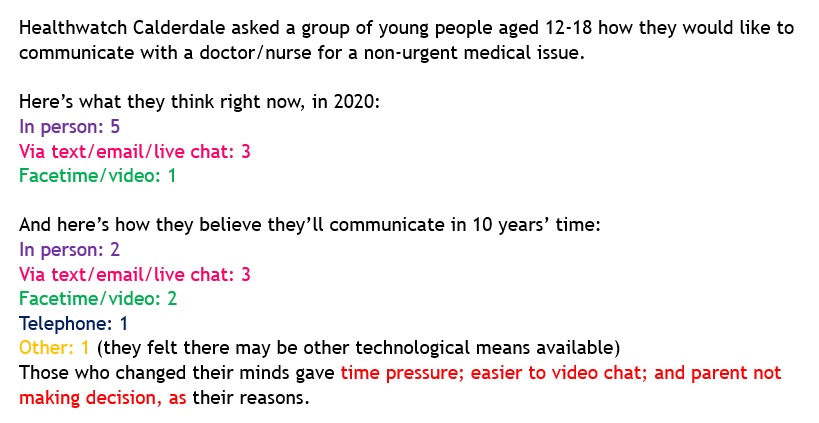
Just for fun:
After we asked young people how they want to speak to a doctor/nurse for a non-urgent medical reason, we ran a poll on Twitter and here’s the result:
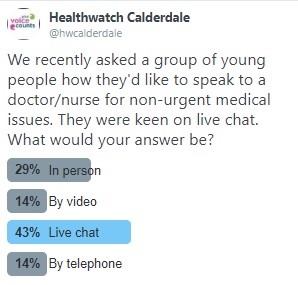
Our second engagement in 2020 was with young Muslim people aged 15-21.
We sought the views about the role and importance of pharmacies in healthcare. This involved educating the young people about what a pharmacy can do to support a person’s healthcare. We also explored the use of digital technology and language barriers.
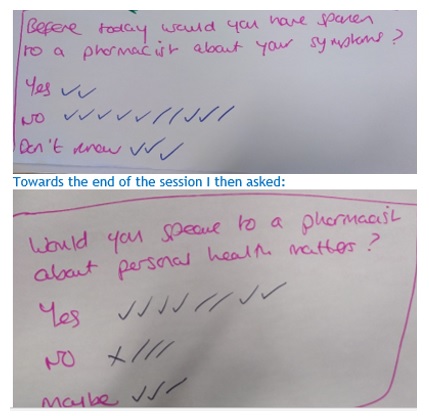
Our third piece of work was with home educated children.
Our work with home educated children was delivered to children aged 7 to 18. It was delivered remotely via digital technology. We explored their understanding of who does what in the NHS; the use of digital technology in healthcare and how they want to get advice for non-urgent medical reasons.
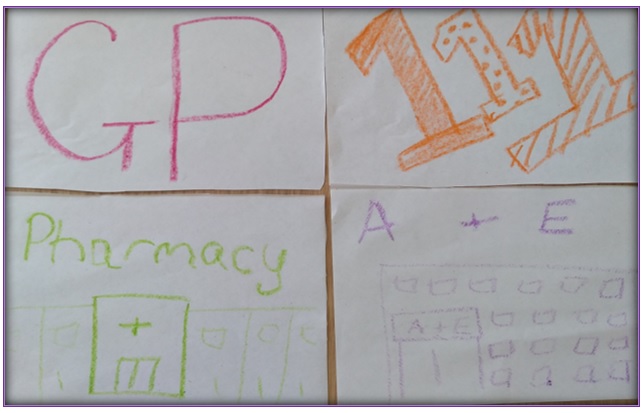
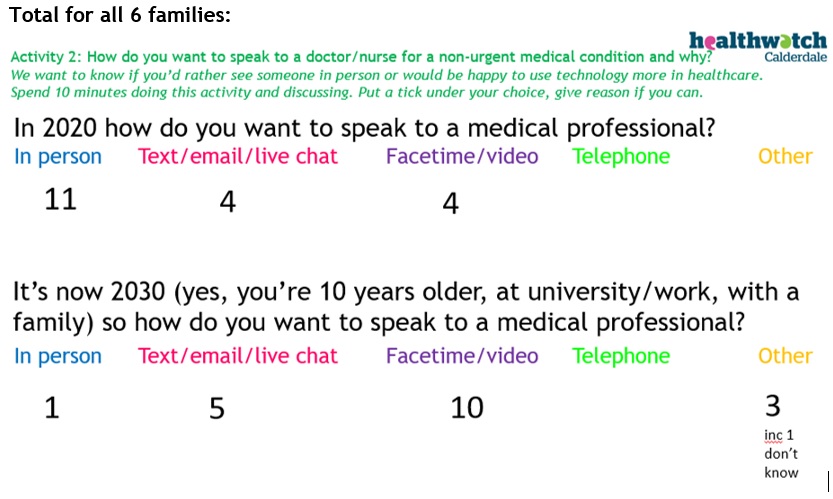
We also focused some work on their views of Covid-19; how they obtained information about it; whether they saw official messages on their social media platforms.
Calderdale children and young people on Covid-19:
Prior to lockdown in March 2020, we had just began a project with home educated children. We continued this project, but ran is remotely and the young people, all aged 7-18, created a mood playlist of songs which reflected how they felt.
We also engaged with many other children and young people to understand their experiences of life during Covid-19 lockdown. All their views and feedback was sent to local organisations that deliver NHS and care services.

Further engagement with children and young people:
We have also delivered engagement at events held by partners in the community. This has largely focused on seeking views of children and young people about the use of digital technology in the NHS for non-urgent medical reasons.
Early years: parents tell us what they wish they knew!
Healthwatch Calderdale has carried out engagement with 6 Calderdale parents about early years support. There were 3 mothers and 3 fathers, all from separate households and each were asked the same question.
Here are the key themes: the Top 4 things they wish they knew:
- More information for dads prior to baby born & in early days;
- How to deal with sleep issues/understanding how babies sleep;
- Breastfeeding support;
- When to wean.
Which NHS/support worker would you go to for support and advice (non-urgent)?
- Midwife before discharge;
- GP thereafter if appropriate;
- Childcare practitioners;
- Parents;
- All said they’d be interested to know more about accessing health visitors after the age of 1.
Where do you look for answers to queries about your children?
- Google for symptoms (i.e. knowing what a child’s temperature should be);
- Local community Facebook groups;
- Childcare providers (nurseries/grandparents);
- Other parents.
 Where would you like to access support, advice and information when your child is young?
Where would you like to access support, advice and information when your child is young?
- Baby groups: all parents took their child to paid-for or free baby groups where activities were run, they said it was a good place to ask questions to seek support;
- Idea: NHS/support organisations could host online Q&A sessions a few times a year promoted via community Facebook groups;
- Nursery/childcare settings: some parents said they use an App; could information be shared via that?
- Grandparents: Some parents relied on their parents for childcare for financial and/or employment reasons (i.e shift work); they said often grandparents aren’t getting the most relevant information such as portion size; toilet training.

